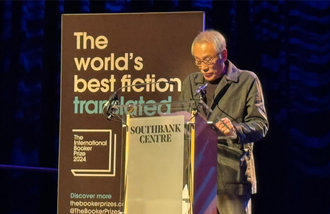Kim Jong Un elevates provocations amid self-idolization efforts
Kim Jong Un elevates provocations amid self-idolization efforts
Posted May. 09, 2024 07:57,
Updated May. 09, 2024 07:57
When Kim Jong Un escorted his father's hearse in December 2011, the 27-year-old shed tears and looked sad. Back then, South Korean authorities were not sure that he would quickly earn the loyalty of senior party leaders and tighten his grip.
Ten years later, in 2021, the Rodong Sinmun called Kim the “Great Leader,” which had always been considered exclusive to his grandfather, Kim Il Sung. This implied that he, in effect, proclaimed himself a leader who exceeded his father and stood shoulder to shoulder with his grandfather. The National Intelligence Service then commented that North Korea attempted to adopt “Kim Jong Un-ism” as a new ideological framework of the regime, a representation of his pursuit of leaving behind the legacy of his predecessors.
Having said that, given his remarks and moves, he could not remove all the traces. Even until recently, he imitated his grandfather from the moment he was singled out as the regime's successor and tried to copy his hairstyle and body shape.
However, Pyongyang has recently shown quite a different approach. Whereas reducing its attempts to deify the previous leaders, the regime is hell-bent on idolizing Kim Jong Un outspokenly. All such change is closely associated with how confident he has become for years. “He is completely different than he was several years ago. He makes a reckless effort to differentiate himself from his predecessors,” said a South Korean government official. Such a heightened level of his confidence may have come from Russian President Vladimir Putin’s generous support, which comes with the two regimes’ close relationship, or some improvements in the food situation following the lifting of the COVID-19 lockdown.
Kim’s self-idolization tactics can inevitably have a great influence on the regime’s approach to South Korea. It is likely that the leader, self-proclaimed as the “Sun,” will take an increasingly aggressive posture with a view to making himself different from his predecessors who regarded South Korea as a homological entity. Kim already named the two Koreas countries hostile to each other, making, in effect, a declaration of war. With this in mind, he will intensify provocations against Seoul while building policy and education systems to define it as a hostile enemy. What’s worse, he may find it easier and more convenient to make it happen at a time when the Korean peninsula is affected by the trends of the New Cold War era.
The South Korean government should respond to North Korea’s explicit change of approach. First, it must be composure and cool-headed to analyze Kim’s intentions, and then it should take firm and resolute action. After all, we know well what cost it has to suffer if it does not confront head-to-head but sits on its hands when Pyongyang signals changes in its framework and policies.







